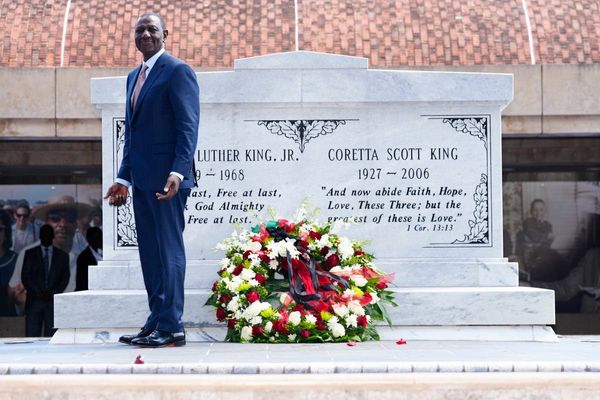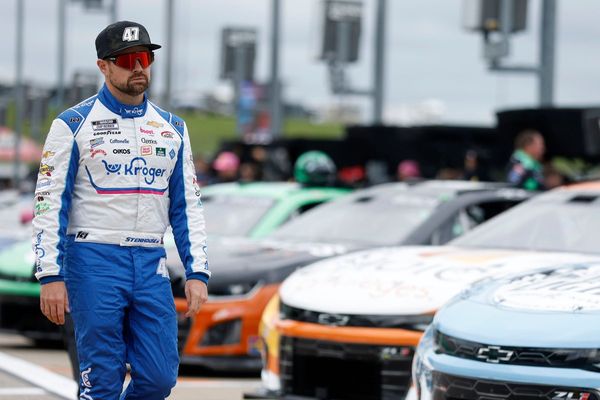
Disney’s dim view of betting changed little in the decades since the 1940 film of Pinocchio, when the puppet visits the cursed Pleasure Island and gambling is one of the vices seducing children who turn into donkeys.
As recently as 2019, the CEO, Bob Iger, declared: “I don’t see The Walt Disney Company, certainly in the near term, getting involved in the business of gambling, in effect, by facilitating gambling in any way.”
Disney even spent over $20m in 2018 lobbying to make it harder to build casinos in Florida, the home of Disney World. Much has changed since, as cord-cutting continues to assail traditional television while sports betting in the US explodes in popularity in the wake of a 2018 supreme court ruling that lets states decide on legalisation.
Last week the Disney-owned sports network ESPN announced a $2bn deal with a gaming company, Penn Entertainment, that will see the launch this autumn of a sportsbook called ESPN Bet.
The biggest brand in American sports broadcasting graduating from covering gambling to promoting it is an about-face for Iger and a major step towards the mainstream for an activity that is now legal and operational in some form in 34 states and Washington DC – though not in the three most populous states, California, Texas and Florida (where the situation is fluid). It is also a sign of turbulent times for media giants in the streaming era.
ESPN was available in 83m households at the start of 2020. It is now in about 71m, according to ratings agency Nielsen. A little more than a decade ago, more than a hundred million homes had access. This decline comes as the cost of sports rights soars amid fierce competition from the likes of Apple and Amazon: under its latest deal, ESPN and its sibling ABC will pay the NFL $2.7bn a year.
ESPN is still a cash machine, producing billions of dollars in annual profit under the creaky pay-TV business model in which networks collect revenue from advertisers and from monthly carriage fees paid by cable and satellite providers, which in ESPN’s case reportedly amount to in excess of $8 a month per subscriber. But it is less lucrative than it used to be. That’s a worry for shareholders and a particular concern for Disney as it battles with shaky revenues in various segments of its sprawling empire amid a Hollywood strike and box-office failures such as Indiana Jones and the Dial of Destiny.
Like other media companies, Disney is in a bind with the industry in flux. Cord-cutting – customers ditching traditional bundled TV subscriptions in favour of bespoke digital purchases – looks set to continue and the new à la carte model is not yet compensating media companies for the switch. Disney’s streaming division lost $512m in its fiscal third quarter and the company is sharply raising prices for some offerings. Subscriptions to the ESPN+ streaming service have risen from 3.5m in 2019 to 25.2m in 2023. Yet ESPN laid off some high-profile names over the summer as a cost-saving measure.
Meanwhile, a record $93.2bn was legally bet on sports in 2022 (excluding tribal casinos), with sportsbooks garnering $7.5bn in revenue, according to the American Gaming Association, an industry body. That is a more than sevenfold increase in three years: in 2019, the figures were $13bn in wagers and $909m in sportsbook revenue.
Enter ESPN Bet. Penn is rebranding its Barstool Sportsbook app and website – which is licensed to operate in 16 states – and handing ESPN $1.5bn over 10 years, with another $500m in stock warrants. ESPN-branded retail locations are also likely to emerge.
“We think this is an opportunity to really appeal to the masses,” the Penn CEO and president, Jay Snowden, said on an earnings call. Penn (which is, unsurprisingly, based in Pennsylvania) is a much smaller player than the industry leaders, FanDuel and DraftKings. But Snowden called the deal an alliance with “the single best brand and platform in the US to reach sports fans and potential bettors” that will deliver “a robust menu of promotion and integration across all of ESPN’s platforms”.
Many American sports teams and leagues have partnered enthusiastically with betting companies. And the success and prominence of Sky Bet in the UK, which uses the broadcaster’s logo and has deployed Sky Sports personalities in its promotional materials, has not gone unnoticed in the US, though ESPN’s main rival, Fox Sports, already tried and failed to do something similar with the loss-making Fox Bet platform, which is closing after four years.
ESPN has offered betting content for years. It launched a programme called Daily Wager in 2019, opened a studio on the Las Vegas Strip in tandem with Caesars Entertainment and its website has a sports betting advice and information section. Now it will boost its coverage, using its various platforms to promote ESPN Bet. When it launches viewers can expect a greater emphasis on gambling, with new shows and online offerings and more in-broadcast odds graphics.
“This is really just the next step in the process for us,” says Mike Morrison, ESPN vice-president for sports betting and fantasy. “We feel at this point there’s enough national attention and interest. Being able to reference betting odds is a fundamental part of telling the story of the game that’s about to happen. Who’s the favourite, who’s going to win, by how much, what’s the expectation?”
As the operator, Penn hopes to leverage the ESPN name to increase its market share after the modest performance of Barstool, a brand tarred by toxic masculinity. For ESPN, the deal isn’t only about bringing in what amounts to an extra $150m a year to offset declining revenue. Like fantasy sports, online gambling is a way to drive brand loyalty and clicks, attract younger, digital-first users, and make live coverage of games more meaningful to viewers.
“It’s going to be a big opportunity for everyone in sports and it’s certainly what fans want, it’s certainly where behaviour is going, we’re seeing it directly tied to higher levels of engagement,” Morrison says. That counts in a fractured and saturated media landscape with innumerable apps, websites and channels competing for eyeballs and dollars.
Still, the tie-up is not without reputational risk for ESPN. Up to 8 million Americans have some degree of gambling problem, according to one estimate. A Gallup poll this year found that 28% of Americans believe gambling is morally wrong. And as gambling becomes easier and legal in more states, the number of player-related scandals is likely to grow; several college football players in Iowa have been criminally charged for alleged illegal gambling, including on games they played in.
Studies in New Jersey suggest that problem gambling, substance misuse and mental health issues are more likely among sports bettors than those who participate in other forms of gambling. “You can see the car crash coming,” says Lia Nower, distinguished professor and director of the Center for Gambling Studies at Rutgers University. “I think there’s going to be well-publicised cases of families being ruined or suicides, all the things that sort of brought all this to light in the UK. I remember when kids were betting on fruit machines in the UK and that underscored what was happening to a lot of these teens.”
Nower would like to see federal oversight of advertising and problem gambling. “Just like the UK, there’s going to be a time lag but then there’s going to be some sort of watershed negative events that are going to happen, then there’s going to be this groundswell of advocacy and then we’re going to be headed towards the way the [UK] Gambling Commission is now policing operators,” she says.
In an earnings call last year, Bob Chapek, the Disney CEO from 2020 to 2022, said that ESPN’s younger viewers want frictionless access to a betting app. “Basically, our sports fans that are under 30 absolutely require this type of utility in the overall portfolio of what ESPN offers,” he said.
Nower’s research indicates that young people – a core market for Disney – are especially vulnerable. “What we know from our studies in New Jersey, a very high proportion of the younger demographic bet in-game, and in-game betting, micro-betting, that lends itself to impulsivity, to not considering how much you’re spending overall because you’re in this heightened state watching the game with your friends,” she says. “You can overspend and young people tend to do that more than older people.”
Penn and ESPN say their partnership will emphasise “responsible gaming” and “responsible marketing policies and guidelines to safeguard fans”.
ESPN is also a prominent and respected source of sports news – and ran a long story last year on an addiction helpline worker. Still, as Front Office Sports has pointed out, it is not hard to imagine a potential conflict-of-interest scenario where an ESPN reporter breaks a story – for example an injury to a star player or the firing of a coach – which then influences betting odds, a matter in which the company is no longer a disinterested party.
Morrison says that ESPN is “working through all the policies” on questions such as whether staff will be allowed to use the app, and that “we’ll have very clear lines” to differentiate news and betting output. “Journalistic integrity is crucial to our brand and how we treat that, nothing changes from that standpoint,” he says.
Nor, Morrison adds, will non-specialist presenters and analysts be expected to shoehorn gambling references into programmes. “It doesn’t work for fans to have someone talking about sports betting who doesn’t understand it,” he says.







